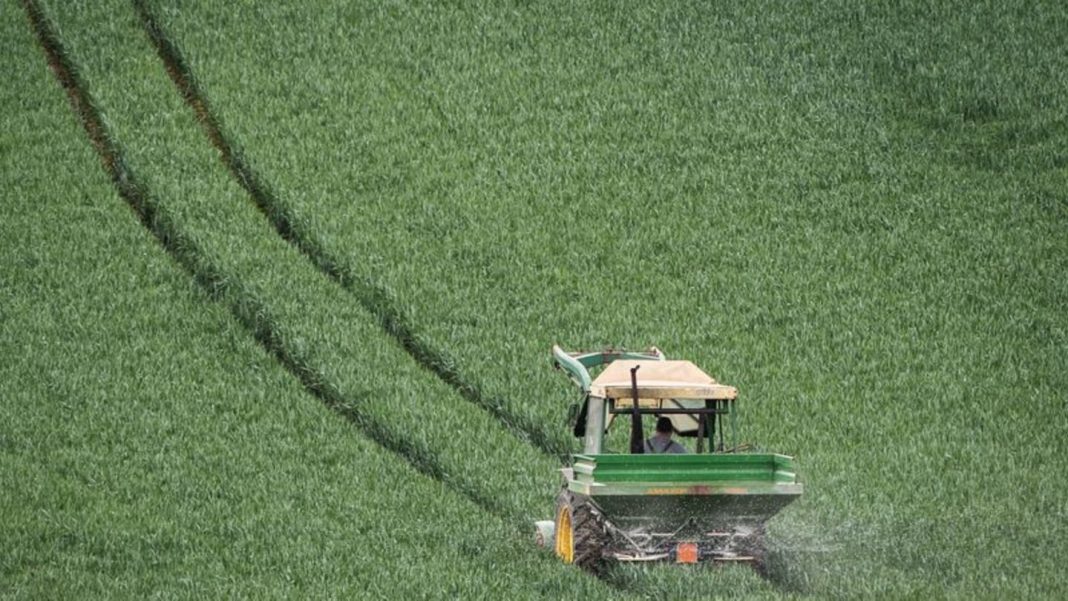Billions In Agricultural Reform
EU Parliament votes in favour of the Agricultural compromise
A tractor on a still green grain field. Photo: Frank Rumpenhorst/dpa
© dpa-infocom GmbH
Shortly before the vote, Greta Thunberg and co. have exerted further pressure on the European members of Parliament. Nevertheless, a majority voted for a compromise on the agrarian reform. The reactions to the decision could not be more opposite.
Regardless of the criticism of environmental activists and nature protection associations, the European Parliament has adopted its Position on the planned multi-billion EU agricultural reform.
A majority of deputies approved on Friday a compromise, the result of several rounds of voting this week. Already on Wednesday, the EU had agreed States, on a line. Thus, both sides can start negotiations with each other on the Reform.
Federal agriculture Minister Julia Klöckner welcomed the outcome of the vote. “We are pursuing the same goal: food security and nutrition, we said, together with more environmental, biodiversity and climate protection in agriculture”, Klöckner. This was also the core of the Decision of the Council of the EU States.
The decision of the Parliament provides that, in the future, 30 percent of direct payments for Eco-schemes are to be reserved. However, the Parliament of the conditionality and the quality of the so-called Eco-Schemes back in the case behind the Position of the EU member States, was of the nature protection Federation of Germany. The EU States had agreed on a 20-percent Eco-regulations. These are environmental measures that go beyond the compulsory requirements for farmers also. A country that meets you, the host, he gets extra money.
Further, the Parliament agreed that the EU countries may set higher Standards about animal and environmental protection. Thus, equal conditions of competition should be guaranteed. The annual direct payments to farmers, in excess of 60 000 Euro, want to shorten the Parliament gradually, and also calls for an upper limit of 100 000 Euro for this.
In the proposal of the Parliament is also provided that four percent of the direct payments for the support of young farmers. Anyone who does not comply with the EU requirements is repeated, should be punished to the draft, according to harder: Up to ten percent of claims are to be allowed to be reduced. So far, there are five percent.
The EU member States are to ask according to the will of the Parliament to the promotion of the diversity of species, the farmers, to use ten percent of your space for landscaping – for example, farmed trees, or ponds, planted with hedges or not the country.
The Chairman of the environment Committee of the European Parliament, Pascal Canfin, has called the reform package a good compromise. “The European Parliament has improved the Text considerably.” Norbert Lins from the CDU said: “The Position of the European Parliament for agricultural reform is timely and innovative.”
WWF-conservation management Board Christoph Heinrich expressed disappointment: “Thus, the Declaration of bankruptcy threatens the “Green Deal” of the Commission.” Greenpeace agriculture expert Lasse van Aken said: “Europe’s greatest opportunity to make farming fit for the future, has lost in the European Parliament today negligently.”
Under #VoteThisCAPdown (on German about: “Rejects CAP”) had also called environmental activists such as Greta Thunberg and Luisa Neubauer to vote against the Position. They criticize above all, this is not a change to a sustainable agriculture and promotes the extinction event.
The Agricultural subsidies are the largest Item in the EU Budget and for a large part of the EU greenhouse gas emissions. For the next seven years the EU member States have provided approximately 387 billion euros. The EU Commission had proposed in 2018 for Reform for the years 2021 to 2027. Because until 2021 and 2022 are already in a transition phase, will only change from 2023 to something.
Also this week, the EU had agreed States, a line for the reform projects. Conservationists criticised also this decision as totally inadequate.
A new feature is also the Eco-rules. New is also that the EU States will have to create a so-called strategic plans, which are reviewed by the EU Commission. The specific agricultural policy is thus designed in the future, probably in the main cities. The amount of the Agricultural subsidies depends on more of the cultivated area of a holding.
For the Eco-regulations of the EU countries, you might want to go also a two-year “learning phase” in which the money ultimately back as lump-sum payments to farmers. Specific requirements for the Eco schemes, there is not yet. The Green MEP Martin Häusling hopes that the EU Commission has submitted under Ursula von der Leyen, but still a better suggestion.



